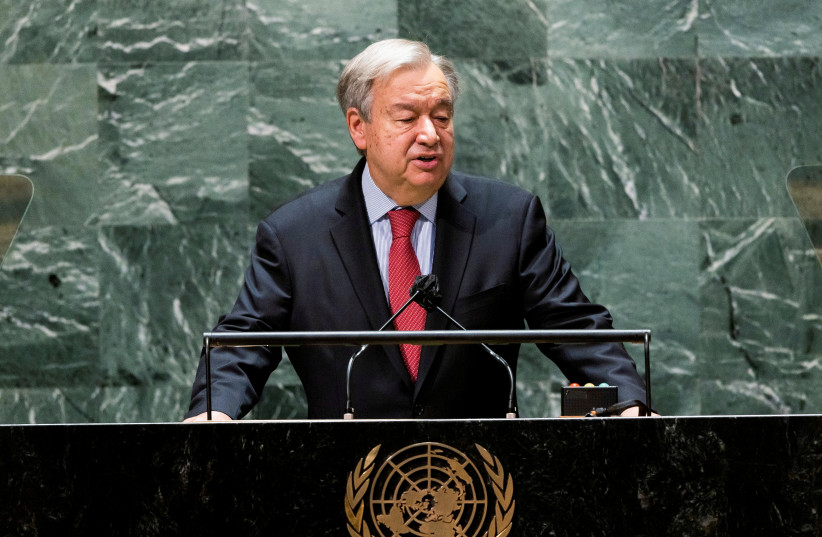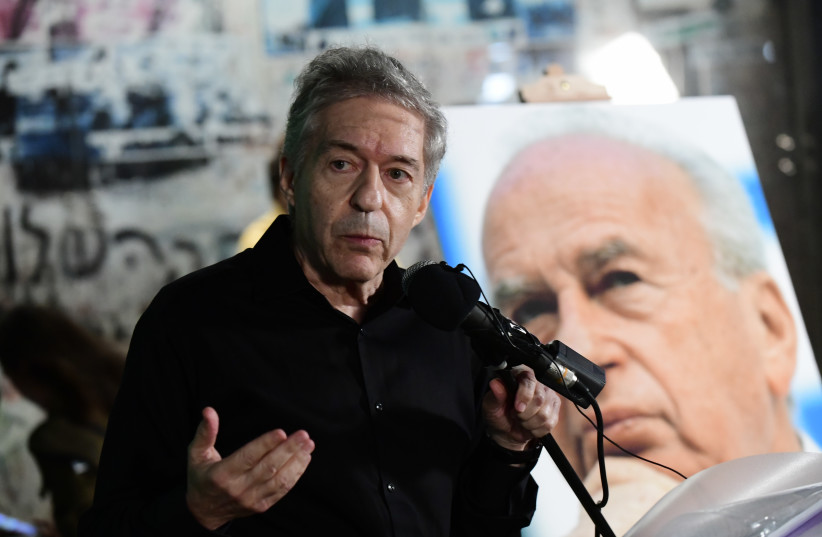The UN Secretary General has been a strong advocate of a two-state resolution to the conflict and reaffirmed that stance at a recent meeting.

United Nations Secretary General Antonio Guterres spoke positively of a new grassroots plan to create an Israeli-Palestinian confederation when he met with the authors of the plan in New York on Friday.
“The Secretary-general received [former Israeli Justice Minister] Yossi Beilin and [former Palestinian negotiator] Hiba Husseini who presented him with their report on the “Holy Land Confederation” process,” Guterres’ spokesperson Stephane Dujarric said after the meeting.
“He thanked them for their useful contribution to try and achieve a lasting solution to the conflict,” Dujarric stated.
Guterres has been a strong advocate of a two-state resolution to the conflict and reaffirmed that stance at the meeting.
“The Secretary-General reaffirms the UN commitment to supporting the parties to achieve a just and peaceful solution to the conflict, including through the Middle East Quartet, and the establishment of two States, based on 1967 lines, with Jerusalem as the capital of both States,” Dujarric explained.
This would be “in line with UN resolutions, international law and previous agreements,” Dunjarric added.
Friday’s meeting marked the end of a series of high level conversation the small group of Israelis and Palestinians held this week in Washington and New York.
They met with US Deputy Secretary of State Wendy Sherman and the nominee for Assistant Secretary of State for Near Eastern Affairs Barbara Leaf as well a number of democratic members of Congress including Senator Chris Van Hollen of Maryland.
Beilin said the meeting with Guterres lasted for 40 minutes and included four of his advisors.
Guterres told them that this plan could perhaps help revive the peace process, Beilin said, adding the Secretary-General expressed regret at the absence of negotiations.
Beilin explained that he asked Guterres if he would include the confederation plan in his talking points with leaders in the region and if he could help the group use the UN platform for debates and discourse on the confederation.
“He [Guterres] promised that in his talks with his interlocutors, as he said, he will raise this option of a confederation,” Beilin said.
Separately, Beilin recalled, Guterres said that “for the first time after many years that he can have a dialogue with the Israeli government.”
Others in the meeting were Brig. Gen. (ret) Shlomo Brom, Prof. Omar Dajani and Dr. Saliba Sarsar.
Beilin said that when they met with Sherman, she was particularly interested in the section of settlers remaining in their homes, given that the issue of evacuating the settlements is one of the most difficult ones on the road to peace.
Sherman did not endorse the plan, Beilin said, but said it was productive and that they had “not given up” and were trying to find a realistic path to peace.
The Holy Land Confederation plan proposes a European Union style confederation of an independent Israeli and Palestinian state based on pre-1967 borders as outlined by the 2003 Geneva Initiative.
This new plan is not formally connected to the Geneva Initiative or to the organization that continues to promote that plan.
Beilin, who was instrumental in the formation of the 1993 Oslo Accord and the Geneva Initiative, has incorporated that latter plan into this latest endeavor.
Among the distinct features of the plan is a joint Israeli-Palestinian narrative of the history of both peoples.
The plan also provides a blue-print by which settlers would remain in their homes as residents but not citizens of a Palestinian state. In exchange a similar number of Palestinians would be allowed to live in Israel as residents but not citizens.
Beilin and Husseiini have published their plan at a time when few Israeli and Palestinians are pursuing talks.
The formal peace process has been frozen for almost eight years. Prime Minister Naftali Bennett has been blunt about his opposition to the creation of a Palestinian state. US President Joe Biden has not spoken of any intention to put forward a peace process at this time.
Content retrieved from: https://www.jpost.com/arab-israeli-conflict/article-696282.
